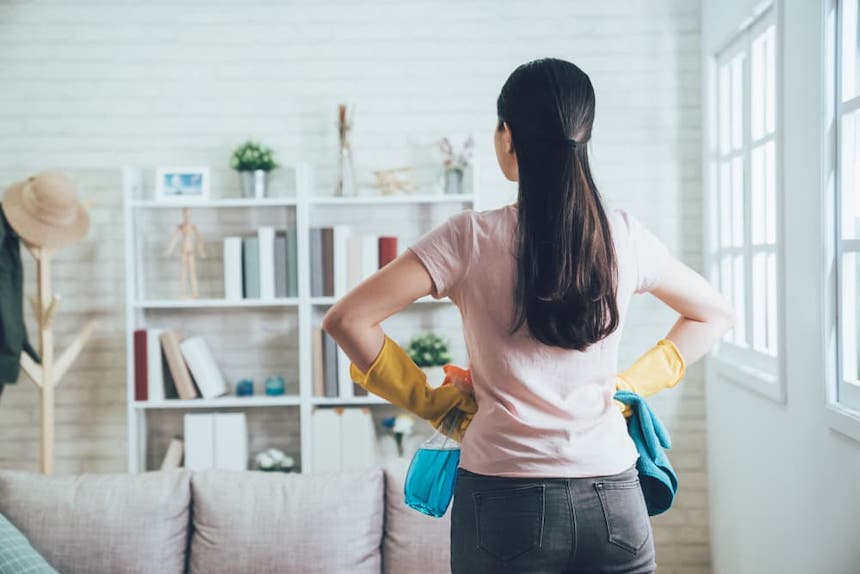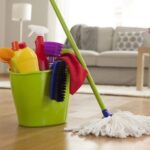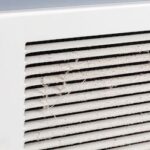
A clean home is not just about appearances, since it also plays a vital role in maintaining our physical and mental well-being. Keeping our living environment clean and tidy goes beyond aesthetic purposes and helps to maintain a more sanitary routine. In this article, we will explore the importance of a clean home and how choosing high-quality hygiene products can contribute to a healthier lifestyle.
Importance of a Clean Home: Cleaning Tips and Tricks
Here are some valuable tips and tricks to maintain a clean home:
- Establish a regular cleaning schedule.
- Declutter and organize your living spaces.
- Clean from top to bottom to prevent dust from settling on previously cleaned surfaces.
- Use microfiber cloths for effective dusting and cleaning.
- Prioritize high-touch surfaces for frequent disinfection.
- Ventilate your home regularly to improve air circulation.
- To maintain a clean home effectively, it is crucial to choose high-quality hygiene products.
The Link Between Cleanliness and Health
A clean home is directly linked to better health outcomes. By maintaining cleanliness, we can reduce the risk of contracting infections, prevent the spread of diseases, and eliminate allergens that can trigger respiratory issues. Regular cleaning and sanitization routines create a healthy living environment for everyone in the household. Let’s check the effects of a clean house.
1. Reducing Allergens and Respiratory Issues
Regular cleaning practices play a vital role in reducing allergens and respiratory issues within the home. Dust, pollen, pet dander, and other airborne particles can accumulate over time, leading to allergic reactions and worsening respiratory conditions. By implementing consistent cleaning routines, it is possible to significantly reduce allergen levels and improve the overall air quality within the living space:
- Regular vacuuming using a vacuum cleaner with a HEPA filter
- Dusting surfaces with microfiber cloths or electrostatic dusters
- Washing fabrics such as bedding, curtains, and upholstery in hot water
- Maintaining proper humidity levels in the home
- Designating certain areas of the home as pet-free zones
By incorporating these simple cleaning practices into a routine, individuals can create a cleaner and healthier living environment. Reduced allergen levels and improved air quality contribute to fewer allergic reactions and respiratory issues, promoting overall well-being and comfort within the home.
2. Preventing the Spread of Illness
Maintaining a clean home is crucial in preventing the spread of illness-causing germs and bacteria. By implementing simple hygiene practices, individuals can minimize the risk of infections, including colds, flu, and gastrointestinal illnesses:
- Regular Handwashing: Proper handwashing is one of the most effective ways to prevent the spread of germs. It is essential to wash hands thoroughly with soap and water for at least 20 seconds, especially before eating, after using the restroom, and after coughing or sneezing. This is one of the most essential hygiene habits to maintain and teach kids.
- Disinfecting Frequently Touched Surfaces: High-touch surfaces, such as doorknobs, light switches, countertops, and remote controls, can harbor germs. Regularly disinfecting these surfaces using appropriate cleaning products helps kill bacteria and viruses, reducing the risk of contamination.
- Proper Waste Disposal: Ensuring proper waste disposal practices is important in preventing the spread of illness. Dispose of used tissues, food waste, and other potentially contaminated items in sealed garbage bags to minimize the risk of germs spreading from the trash.
- Regular Cleaning of Kitchen and Bathroom: The kitchen and bathroom are common areas where germs thrive. Regularly cleaning and disinfecting these areas, including countertops, sinks, toilets, and cutting boards, can help eliminate harmful bacteria and reduce the risk of foodborne and waterborne illnesses.
- Promoting Respiratory Hygiene: Encouraging good respiratory hygiene practices, such as covering the mouth and nose with a tissue or elbow when coughing or sneezing, helps prevent the spread of respiratory infections. Regularly cleaning and disinfecting items like tissues, face masks, and handkerchiefs is also important.
3. Enhancing Mental Well-Being
The state of our living space can have a significant impact on our mental well-being. A cluttered and untidy home can contribute to feelings of stress, overwhelm, and anxiety. Conversely, a clean and organized home promotes a sense of calm and tranquility, providing a peaceful sanctuary where individuals can relax, unwind, and rejuvenate their minds.
- Reduced Stress and Overwhelm: A clutter-free environment reduces visual distractions and the feeling of being overwhelmed by the chaos around us. A clean home promotes a sense of order and control, creating a more peaceful and stress-free atmosphere.
- Enhanced Relaxation: A tidy living space creates a more inviting and comfortable relaxing environment. When we enter a clean and organized home, we can more easily let go of the day’s stresses and find solace in a serene atmosphere.
- Improved Focus and Productivity: A clean and organized home allows for better focus and concentration. With fewer distractions and visual clutter, our minds can stay clear and focused on the tasks at hand, leading to increased productivity and efficiency.
- Positive Mood and Mental State: Our living environment influences our mood and mental state. A clean and well-maintained home promotes feelings of happiness, contentment, and overall well-being. It creates a positive atmosphere that can uplift our spirits and contribute to a more positive mindset.
4. Promoting Physical Fitness
Maintaining cleanliness in the home encourages physical activity. Regular cleaning tasks like sweeping, mopping, and scrubbing can be considered light exercises that contribute to overall physical fitness. Additionally, a clean and uncluttered home provides ample space for movement and encourages an active lifestyle.
Incorporating physical activity into our cleaning routine can improve coordination, flexibility, and muscle strength. Engaging in these activities not only keeps the home clean but also offers a convenient way to stay physically active. With a clean and organized living space, we create an environment that supports movement and motivates us to lead an active lifestyle.
5. The Impact of Cleanliness on Sleep Quality
A clean bedroom environment is essential for a good night’s sleep. Dust-free surfaces, fresh bedding, and proper ventilation contribute to a comfortable sleep environment. Quality sleep is crucial for both physical and mental well-being, and a clean home plays a significant role in achieving restful nights.
To Sum Up
To maintain a clean and organized home, consider implementing the following practices:
- Create designated storage areas for different items.
- Regularly declutter and donate unused or unwanted belongings.
- Put things back in their designated places after use.
- Develop a habit of tidying up before going to bed.
- Involve all household members in cleaning tasks to distribute the workload.
- Seek professional cleaning services periodically for deep cleaning.
A clean home is not only visually appealing but also essential for our physical and mental well-being. Regular cleaning, choosing high-quality hygiene products, and adopting eco-friendly practices contribute to a healthier living environment. By prioritizing cleanliness, we can enhance our overall quality of life and enjoy the benefits of a tidy, organized, and peaceful home.
- 12 Ways How a Hearing Aid Will Improve Your Daily Life - August 8, 2023
- The Importance of a Clean Home for Physical and Mental Well-Being - August 1, 2023
- 7 Hygiene Tips: How To Make Your Routine More Sanitary - April 29, 2023






